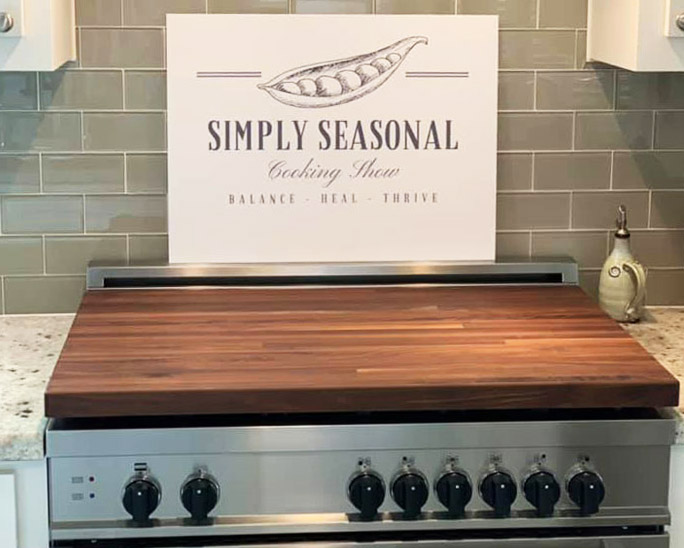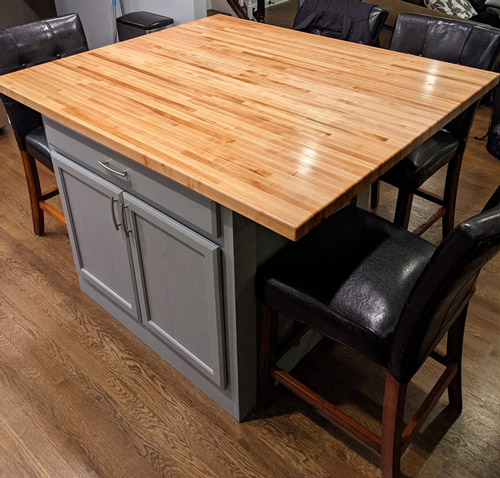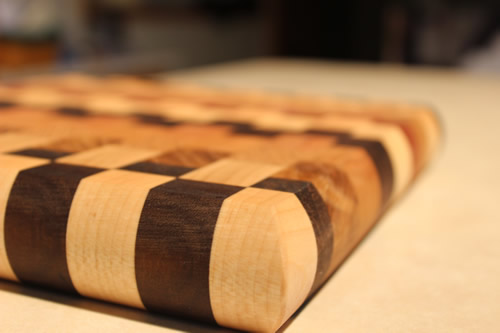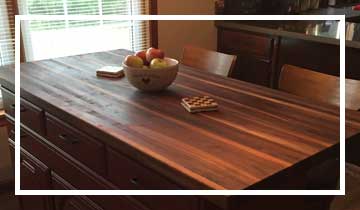Edge Grain vs End Grain Butcher Block Countertops: The Pros & Cons of Each
As a homeowner, or the owner of a café or bar, you know just how important it is to have your residential and commercial kitchen and dining area(s) looking both beautiful and functional. Indeed, butcher block wood countertops are an ever-popular and a timeless choice for your kitchen and dining room. In your research, you've probably more than likely have come across a couple different types of butcher block: edge grains and end grains.
Both options will provide your kitchen with warmth, natural beauty, and functionality. But you’re likely thinking, "which should I order?"
In this article, we’ll cover the aspects of both edge grain and end grain butcher block, explore their pros and cons, and help you make an informed decision for your kitchen.
Table of Contents: Edge Grain vs End Grain
Is edge or end grain better for your butcher block countertop? Ultimately, it comes down to your personal preference for aesthetics and the type of use you have for it. Let's talk about edge and end grain below:

Order Your Butcher Block Today!
Read More: 5 Reasons You Should Choose Wood Countertops
Edge Grain vs End Grain - Terminology to Know
Before we review edge grain and end grain, it's best to first understand the difference among these. First, let's consider the grain in a piece of butcher wood. Every piece of lumber has three surfaces:
- Face Grain: the top, or what you see on the outside of the board.
- Edge/Side Grain: the side or the thickness of the board.
- End Grain: the end of the board.
Edge Grain Butcher Block Countertops
Edge grain butcher block countertops are crafted by arranging and gluing wood strips side by side, with the long edges forming the visible surface. This construction style creates a durable countertop with a beautiful linear pattern.
Wood types you’ll commonly find that use an edge grain style include: hard maple, red oak, cherry, hickory, and walnut, just to name a few.

Benefits of Edge Grain
From durability, to aesthetic appeal, here are just some reasons why you should choose edge grain butcher block over other countertop surface types:
- Durability: When it comes to durability, edge grain butcher block countertops offer years of resistance to daily wear and tear. Edge grain butcher block surfaces are overall less prone to warping or cracking compared to other options, making it a reliable choice for heavy kitchen use.
- Cost-Effective: When compared to end grain countertops, edge grain options tend to be more affordable. This makes them a practical choice for homeowners on a budget who are also still interested in investing in a beautiful, yet functional butcher block countertop.
- Aesthetic Appeal: Edge grain’s linear pattern provides a visually appealing touch to any contemporary or classic kitchen. In addition, the variation in wood grain and color creates a warm and inviting atmosphere, blending well with different design styles.
End Grain Butcher Block Countertops
End grain countertops are crafted by arranging wood blocks vertically, with the cut ends forming the visible surface. This construction style results in a distinct checkerboard pattern that many homeowners enjoy and prefer over edge grain.
Besides visual aesthetic appeal, end grain butcher block also offers excellent durability and a knife-friendly surface that many homeowners love. The benefits of end grain butcher block include:
Benefits of End Grain
There are several pros to choosing end grain over edge grain. These include:
- Durability: End grain countertops are known for their exceptional durability, due to the vertical orientation of the wood blocks - which allows them to withstand heavy chopping and cutting without leaving visible marks or scars. This makes them a perfect choice for serious home cooks or professional chefs.
- Knife-Friendly Surface: One of the best features of end grain countertops is their knife-friendly surface. The wood fibers in an end grain configuration allow the knife to penetrate between them, resulting in minimal damage to the blade. This helps maintain the sharpness of your knives for longer periods.
- Unique Aesthetics: The checkerboard pattern created by the end grain construction method gives these countertops a unique and eye-catching appearance. This distinct visual appeal can become a focal point in your kitchen and add a touch of elegance to the overall design.
Order Butcher Block Here!

Edge Grain vs End Grain: Which Should I Choose?
The decision of whether you should choose edge grain or end grain butcher block will ultimately come down to your:
- Personal preferences
- Specific requirements
- Budget
Edge grain countertops provide homeowners with all the durability, stability, and affordability you’re looking for. By contrast, end grain butcher block countertops excel in exceptional durability, knife-friendliness, and unique aesthetics, making them ideal for avid cooks. Ultimately, you should take into consideration your cooking habits, design preferences, and budget constraints to make the best choice for your kitchen and dining room.
Read More: 6 Things You Should Know Before Installing Butcher Block Countertops
Why Choose Forever Joint Tops?
So, why should you choose Forever Joint Tops for your maple, walnut, oak, or hickory edge or end grain butcher block countertop installation? With over 50 years of experience, Forever Joint Tops takes great pride in serving our valued clients. We are deeply committed to delivering excellence in everything we do. We can help you understand how to finish your butcher block and more.
When you order a custom butcher block wood countertop, kitchen island, table top, floating shelf, desktop, or bar top from us, you can expect prompt customer service and meticulous attention to detail throughout the shipment process. Furthermore, all our hickory, maple, walnut, and oak products are crafted from 100% American-grown lumber. We employ CNC precision equipment to ensure precise cuts, eliminating the potential for human error.
At Forever Joint Tops, we strive to provide you with high-quality, handcrafted products that enhance the beauty and functionality of your space. With our commitment to excellence and the use of top-notch materials, you can trust us to deliver a countertop that meets your exact specifications and exceeds your expectations. With Forever Joint Tops, you’ll be able to make an informed decision when choosing between edge grain and end grain butcher block countertops!
Read More: Why You Should Choose Butcher Block for Your Next Home Project
Contact Us for a Quote!
Have questions for our team, or discuss your order over the phone? Give us a call directly at (608) 566-6903. Need help with understanding how to install your butcher block, how to clean your butcher block, or even the basics of how to apply finish, mineral oil/organic beeswax or conditioner, (we highly recommend that you use Waterlox products for this) check out our informational pages linked here for more info!
Get a Quote on Your Butcher Block!
Further Reading:
- Butcher Block Finishing & Care Instructions
- 5 Custom Butcher Block Desk Ideas to Inspire You
- 8 Reasons Why Restaurant Butcher Block Tables are a Great Choice!
- Floating Wall Shelves: The Ultimate Buying Guide
- Pros and Cons of Butcher Block Countertops
- 3 Ideas for How to Enhance Your Kitchen with Butcher Block

